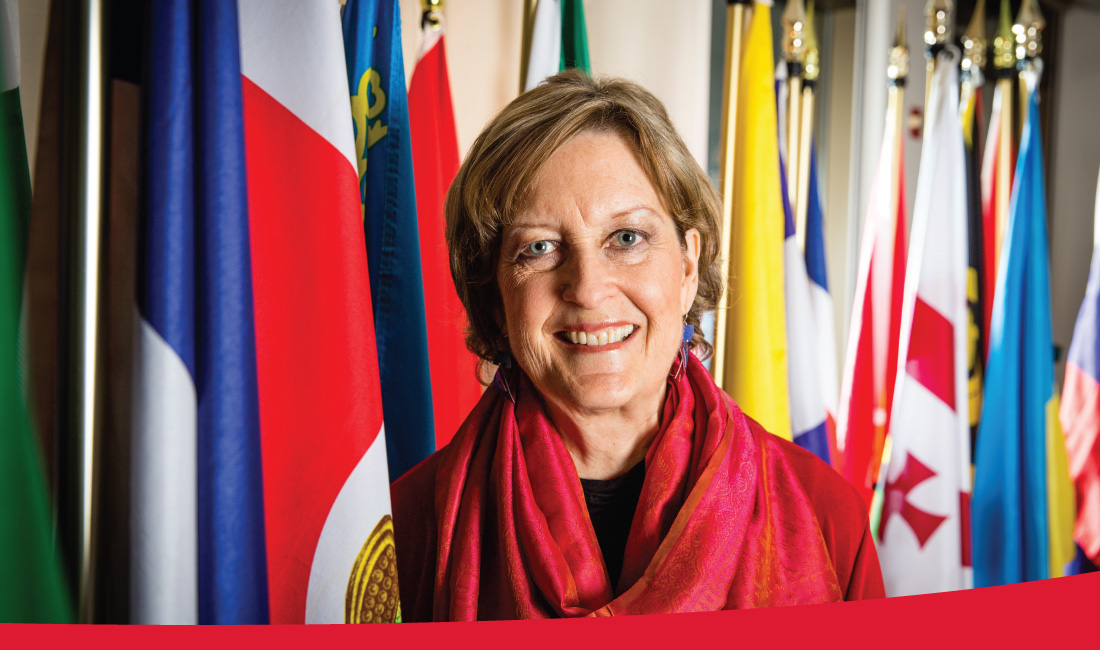
Jody Olsen, PhD, MSW
University of Maryland, Baltimore
Global Impact
Growing up in Salt Lake City, Jody Olsen, PhD, MSW, was fascinated by the striations that Lake Bonneville etched into the mountains above the Great Salt Lake thousands of years ago. “It’s years of history written in the rocks and layers that you see,” Olsen said.
As an adult on her first trip outside the U.S., Olsen was similarly fascinated when she saw the layers of ruins left behind by the Phoenician and Roman empires in what is now Tunisia.
One was created by nature; the other by humans, but to Olsen they were the same. “Understanding what 2,000 years of history was about gives you a tremendous respect for culture,” says Olsen, a visiting professor at the University of Maryland School of Social Work. “It shows you how our heritage plays into who we are.”
That abiding respect for culture and heritage has guided Olsen’s extraordinary career, from leading the country’s flagship international service organization to directing the Center for Global Education Initiatives at the University of Maryland, Baltimore (UMB).
For eight years, Olsen was deputy director of the U.S. Peace Corps; the last eight months of her tenure, she served as acting director. She rose through the corps’ leadership from the ranks of its volunteers, one of 215,000 who have served in the organization to date.
Between her Peace Corps stints―four of them, all told―Olsen was senior vice president at AED, an international development organization, and executive director of the Council for International Exchange of Scholars, which manages the Fulbright Scholar Program.
Olsen knew she wanted to work globally during her first few days as the Peace Corps’ country director in Togo. With the ink barely dry on her dissertation―a study of end-of-life satisfaction in elderly populations―Olsen landed in the West African nation with her family. There, she oversaw the work of 135 volunteers.
“I walked into that office and I knew immediately I would stay international,” she said. “I liked the action. I liked leading international teams and creating an environment for people to be successful.”
Before assuming the Peace Corps’ top job, Olsen served as regional director for North Africa, the Near East, Asia, and the Pacific, and traveled to more than 100 countries supporting the work of volunteers as they settled into local communities, learned obscure languages, and improved lives. “I learned more than I gave,” she says.
Working at UMB is Olsen’s way of giving back.
As director of the Center for Global Education Initiatives and co-chair of the Global Health Interprofessional Council (GHIC), Olsen is using her famously deep knowledge of international development and her unparalleled commitment to interdisciplinary learning to redefine high-quality out-of-country experiences and give UMB students a transformative global education.
Supported by the center’s first round of grants funding global interprofessional projects, 33 students from all seven UMB schools recently traveled in teams to Rwanda, Kenya, Gambia, Malawi, Zambia, Hong Kong, and the Philippines to work on solutions to community-specific health problems. Ten faculty members from UMB’s six professional schools led the projects.
The grant program grew out of a four-year, Malawi-based GHIC project in which teams of students conceived and implemented integrated solutions to health-related challenges. The Malawi project showed that students need more support developing “soft” skills—things like communication, collaboration, and team building. Olsen and the council are now working to build these global health competencies.
“We’re trying to cultivate a mutually respectful situation to solve problems,” says Olsen. “The opportunity to do that is a gift. It gives students a head start in a world where we’re increasingly dependent on each other.”
“Jody Olsen is a tireless champion for developing the campus infrastructure and faculty and student competencies to ensure that we can effectively and safely deliver great global education,” says Richard P. Barth, PhD, MSW, dean of the School of Social Work. “She is a terrific communicator, relentlessly optimistic and affirming, and exceptionally knowledgeable about all things international.”


